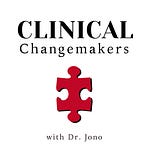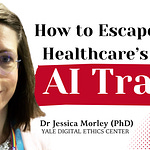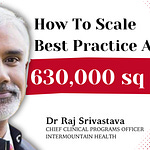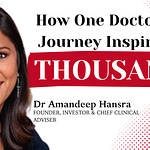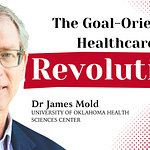"Psychological safety is at the very heart of this discussion... a belief that it is safe for interpersonal risk...in my research I have found this not to be the norm, but it is a very powerful thing when it's there."
— Professor Amy Edmondson, Novartis Professor of Leadership and Management at Harvard Business School.
Listen on Apple, Spotify, YouTube or wherever you get your podcasts.
In this episode, Novartis Professor of Leadership and Management at Harvard Business School, Amy Edmondson demystifies the exciting field of Organisational Behavior.
She begins by discussing her transition from Engineering into Organizational Behavior, how clinicians compare to other professional fields, how identity and blind spots impact health professions, and the principles of high-reliability organizations.
Professor Edmondson explores the concept of the ‘recovery window’, how psychological safety is a core part of successful teams, and how workarounds feel good but may inhibit efforts to solve systemic problems.
Key Takeaways
The Professional Trap: Healthcare professionals are trained to rely on individual expertise and professional hierarchies rather than organizational management structures. This creates blind spots where clinicians may miss crucial interpersonal dynamics, patient communication barriers, or insights from other team members like social workers or nurses. The challenge isn't lack of knowledge—it's that deep expertise can make it harder to recognize what you don't know, especially about team dynamics and organizational systems.
Psychological Safety as Patient Safety: The concept of psychological safety—the belief that you can speak up with concerns, questions, or mistakes without fear—directly impacts patient outcomes. Healthcare teams with higher psychological safety catch more problems during the "recovery window"—that critical period between when someone first notices something might be wrong and when a safety incident actually occurs. Without psychological safety, these windows are consistently squandered.
The False Economy of Efficiency: Healthcare's push for short-term efficiency through tighter scheduling and faster patient throughput often creates long-term inefficiencies. When appointments are stacked too tightly without slack for uncertainty, providers miss preventative care opportunities and fail to address complex cases adequately, leading to more expensive problems later. True efficiency requires building in time for the variability inherent in patient care.
Where to Find Our Guest
In This Episode
00:00 - Introduction: Professor Amy Edmondson's transition from engineering to organizational behavior
04:09 - Why healthcare underemphasizes organizational dynamics despite their complexity
08:10 - The professional model: How expertise creates blind spots and goal misalignment
15:12 - Learning from high reliability organizations: Aviation and nuclear power principles
19:40 - The speed of change: How aviation transformed safety culture in years, not decades
22:20 - The recovery window: From noticing problems to preventing safety incidents
24:29 - Defining psychological safety: Creating contexts safe for interpersonal risk
27:15 - Situational humility and proactive inquiry: Practical leadership behaviors
33:20 - Innovation in cardiac surgery: Why some teams succeeded while others abandoned efforts
39:11 - Crisis vs. perma-crisis: Leading through ongoing uncertainty rather than acute emergencies
42:28 - The workaround trap: When individual problem-solving inhibits organizational learning
46:03 - Practical application: Simple behaviors that transform team dynamics
About Our Guest
Amy C. Edmondson is the Novartis Professor of Leadership and Management at Harvard Business School, a chair established to support the study of human interactions that lead to the creation of successful enterprises that contribute to society's betterment. Amy is the author of Teaming: How Organizations Learn, Innovate and Compete in the Knowledge Economy (2021), The Fearless Organization: Creating Psychological Safety in the Workplace for Learning, innovation and Growth (2018), and Right Kind of Wrong: the science of failing well (2023).
Referenced
Website: Amy C. Edmondson
Newest Book: Right Kind of Wrong, The Science of Failing Well
TEDx Talk: Building a Psychologically Safe Workplace
Edmondson AC, Roberto MA, Bohmer RM, Ferlins EM, Feldman LR, Starbuck WH & Farjoun M. 2005. “The recovery window: Organizational learning following ambiguous threats.” Organization at the limit: Lessons from the Columbia disaster, 220-245.
Contact
If you have any feedback, questions or if you'd like to get in touch, reach out at jono@clinicalchangemakers.com
Music Attribution: Music by AudioCoffee from Pixabay
Before you go! 🙌
As a small independent podcast, every rating and share makes a real difference in helping us reach more healthcare leaders. If you found value here, please rate us and pass this along to a colleague who needs to hear it.


